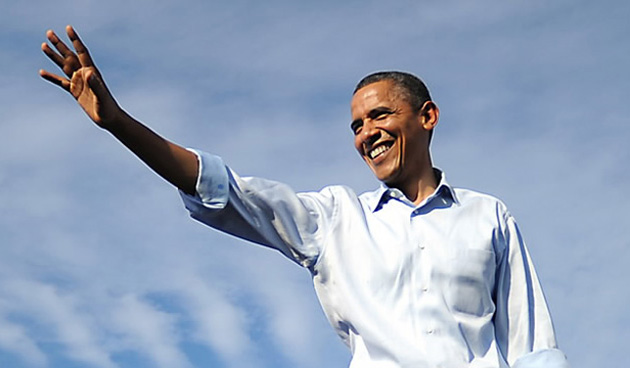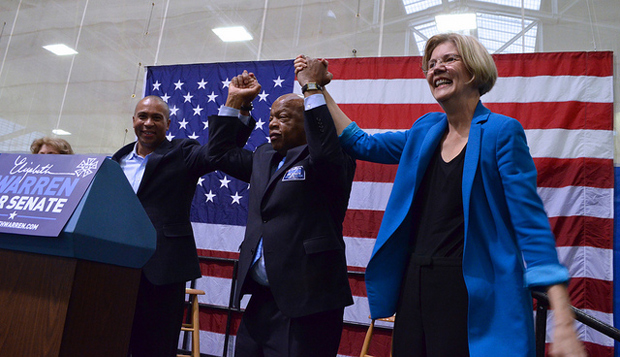The news moved slowly through the crowd. There were no boos, no hisses, no dropped glasses. Country singer Jamie O’Neal and the band had just finished the last song of their set. But there was Fox News anchor Bret Baier, on the big screen at the Republican National Convention’s election night party in downtown Washington, soberly delivering the news: President Obama was projected the winner of Ohio’s 18 electoral votes.
“That’s the presidency,” Baier said.
“It’s over,” added Fox White House correspondent Ed Henry.
Tom Lea, a tall, suited Republican from Southern California, was standing near a table piled high with baked pretzels and mini-slices of cheese and mushroom pizza when the call was made. Lea was angry—at the voters who’d inexplicably handed President Obama a second term, at a Congress divided by gridlock, at the direction of the country as a whole.
“It doesn’t get any more bleak than this,” Lea told me. “This is not hyperbole: This country is done. The writing’s on the wall. Dead.”
Lea said he believed newly elected Senate Democrats like Massachusetts’ Elizabeth Warren and returning Democrats like Claire McCaskill would do nothing to fix what he called our “divided government.” He also hammered the president for doing nothing to bridge that partisan divide. “This president has not reached across the aisle to work with the members of the House,” Lea said. “This government isn’t working. We just inherited a worse government than what we had in 2008.”
The RNC’s election party was expected to attract 2,500 to 3,000 guests, RNC spokesman Tom Kise told reporters early in the night. And the main space at the Ronald Reagan Building did indeed fill up fast as polls closed across the country. The party roared with the sound of rollicking country tunes and chatter among the crowd. The guests nibbled their snacks and sipped their cocktails and watched the returns, the men dressed in suits, the women in tight dresses.
As the news trickled in—big Democratic wins in Senate races in Massachusetts, Missouri, Indiana, and Connecticut—the energy ebbed. At just past 11 p.m., the night’s emcee urged partiers to keep their spirits up, wait for all the results to come in, and to have “one or two more drinks” while they were at it.
But the party had thinned by the time Baier called the race for Obama. Half an hour later, it was abandoned but for a loyal few. A few couples still danced to the sound of the band while the catering crew cleared the food and the bartenders began stacking their cocktail glasses. Guests streamed toward the exits, arms interlocked, dressed in wool coats and scarves against the November chill.
DC residents Jonmarc Buffa and Liz Kelly made for the exits as the party died down. Buffa held a miniature American flag, and an “I voted!” sticker was affixed to his jacket. Buffa was at a loss to explain why, say, a working-class single mother in Cleveland would vote for Obama. “You have to admit: If you’re unemployed right now, continuing what we have currently is not going to get you very far,” he said. He added, “I think Democrats this time were able to convince people to vote against their own self-interest, which to me was shocking.”
Buffa did give the Democrats some credit. He said their get-out-the-vote operation was superior, and GOP voters just weren’t as motivated. “Republicans once again didn’t do what they should’ve done, which is show up.”
Kelly, Buffa’s spouse, had her own take: Republicans from Mitt Romney on down let themselves get too entangled with social issues like abortion. “Republicans are shooting themselves in the foot,” she said. Conservatives are “completely right on economics, but they’re completely wrong on social issues.”
Kelly said she’d recently graduated with a master’s degree in social work. The job market she entered was bleak—and she didn’t see President Obama doing anything to improve it. But so long as Republicans fielded candidates such as Missouri’s Todd Akin or Indiana’s Richard Mourdock—both candidates tripped up by controversial gaffes about rape and abortion—the party wasn’t going anywhere, she said.
Buffa was even grimmer with regard to the next four years. “I think at the end of the day,” he said before heading out into the cold, “people are going to regret this day.”













